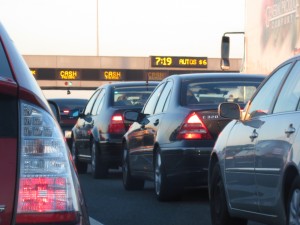The White House proposes a strict new national fuel standard, but California still leads the way

On Wednesday, just as the Obama Administration proposed strict new fuel efficiency standards for 2017-2025-model cars and light trucks, the California Air Resources Board leapfrogged Washington with its own package of regulations designed to further reduce emissions from passenger vehicles.
The proposed “Advanced Clean Cars” regulations package has four components, including a greenhouse gas emissions standard that matches the new federal one, which isn’t surprising since California played a key role in drafting the new federal proposal.
The other three prongs of the package are new smog-reduction rules, a program designed to spur the growth of zero-emissions vehicle production and sales, and the construction of new hydrogen fueling stations.
According to CARB, the Advanced Clean Cars regulations are designed to deliver:
- A 47% reduction of greenhouse gas emissions by 2025, compared to today’s levels;
- A further 75% reduction in smog-forming emissions by 2025;
- One in seven new cars sold in 2025 (15.4 percent) be a zero-emission or plug-in hybrid vehicle;
- A total of 1.4 million zero-emission and plug-in hybrid vehicles on the road in California by 2025;
- A reduction of 40 million tons of greenhouse gases in 2025, the equivalent of taking eight million cars off the road; and,
- A savings of $5 billion in operating costs in 2025 for California drivers. This will rise to $10 billion in 2030 when more advanced cars are on the road.
Whew. CARB’s Zero Emissions Vehicles (ZEV) program aims to have battery, fuel cell, and plug-in hybrid electric vehicles account for up to 15% of California’s new vehicle sales in 2025, which, according to the Union of Concerned Scientists (UCS), means that dealers had better get moving and sell 1.4 million of these vehicles between 2018 and 2015.
UCS is urging an even more ambitious plan, however, arguing that in order for California to reach its climate and public health goals, the bar should be set higher, at 1.8 million ZEV sold by 2025.
